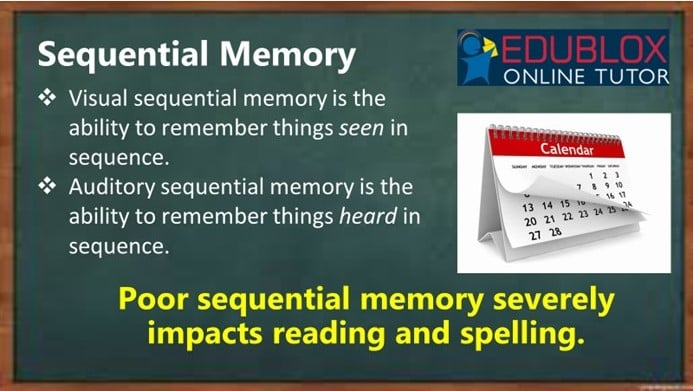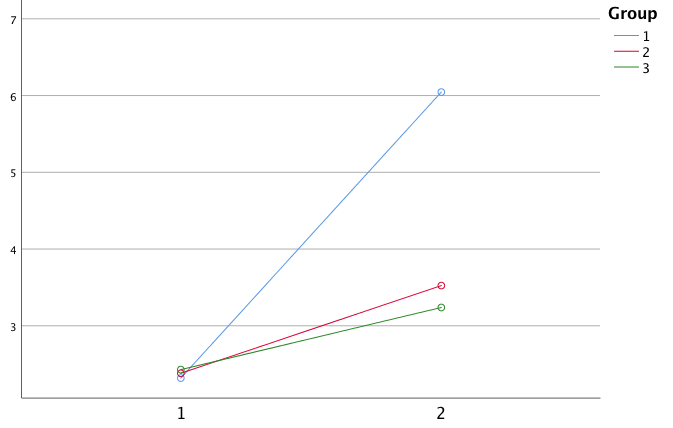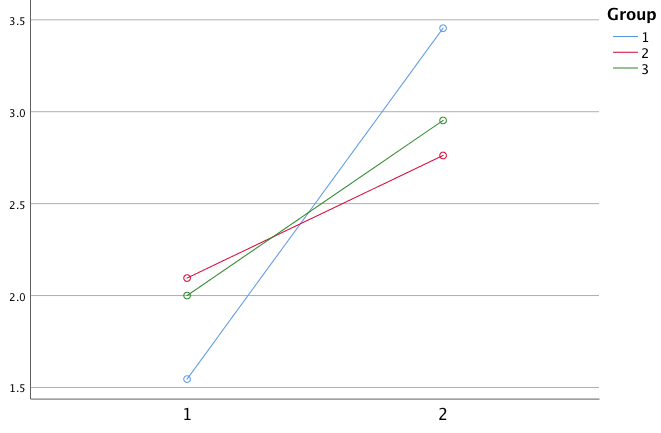 Memory is the process by which knowledge is encoded, stored, and later retrieved. Although the word memory may conjure up an image of a singular, “all-or-none” process, it is clear that there are many kinds of memory, each of which may be somewhat independent of the others.
Memory is the process by which knowledge is encoded, stored, and later retrieved. Although the word memory may conjure up an image of a singular, “all-or-none” process, it is clear that there are many kinds of memory, each of which may be somewhat independent of the others.
Sequential memory requires items to be recalled in a specific order. In saying the days of the week, months of the year, a telephone number, the alphabet, and counting, the order of the elements is paramount.
Visual sequential memory is the ability to remember things seen in sequence, while auditory sequential memory is the ability to remember things heard in sequence. Serial memory is a synonym for sequential memory.
Consequences of poor sequential memory
Many students have trouble with sequencing and poor sequential memory, which naturally affects their reading and spelling abilities. After all, every word consists of letters in a specific sequence. To read, one has to perceive the letters in sequence and also remember what word is represented by that sequence of letters. By changing the sequence of the letters in name, it can become mean or amen.
When reading, students with poor sequential memory may put letters in the wrong order and read felt as left, act as cat, reserve as reverse, and expect as except. They may put syllables in the wrong order and read animal as ‘aminal’, hospital as ‘hopsital’, and enemy as ‘emeny’. They may put words in the wrong order and read are there for there are. They may write letters in the wrong order and spell Simon as ‘Siomn’, time as ‘tiem’, and child as ‘chidl’. They may omit letters, i.e., read or write cat for cart, wet for went, and sing for string. They may be unable to repeat longer words orally without getting the syllables in the wrong order, such as preliminary and statistical.
Poor readers have poor sequential memory
Guthrie and his team investigated relationships between visual sequential memory and reading in 81 typical and 43 disabled readers. The children had normal intelligence and a mean reading grade of 2.5. Partial correlations between three tests of visual sequential memory and three tests of reading were computed. Significant positive associations were identified between visual sequential memory and paragraph comprehension, oral reading, and word recognition.
A study published in the Journal of General Psychology compared 33 12-year-olds with dyslexia and 33 controls and found the dyslexic children inferior to controls on tasks involving visual sequential memory and auditory sequential memory.
Another study, published in the Archives of Clinical Neuropsychology, compared 24 readers with dysphonetic dyslexia and 21 with dyseidetic dyslexia to 90 control group participants. The study revealed that auditory serial memory was impaired in both dyslexia types and a strength for good readers.
Poor spellers have poor sequential memory
A study by Maitland investigated the relationship between visual sequential short-term memory and spelling ability. An experimental sample of 77 typical grade four subjects was used. Results suggest visual sequential short-term memory for verbal information as a possible cognitive ability underlying the process of spelling.
Magro et al. (2012) conducted a longitudinal study that tested 116 French-speaking children in first grade and two years later in third grade. The researchers tested the children at the end of first grade on tasks designed to access sequential short- and long-term memory. When the kids were in third grade, the researchers assessed their spelling abilities using irregular words, regular words, and pseudoword writing-to-dictation tasks.
Regression analyses showed that sequential short-term memory predicted their spelling of pseudoword and irregular words, while sequential short- and long-term memory best predicted their spelling of regular words.
Sequential memory essential for math
In a study by Wood et al. (2018), visual serial memory was significantly associated with numeracy. Visscher et al. (2015) showed that adults with dyscalculia have a sequential memory deficit characterized by slow learning and quick degradation of sequences. Dyscalculia is a specific and persistent difficulty in understanding numbers, which can lead to a diverse range of difficulties with mathematics.
Improving your child’s sequential or serial memory can boost your child’s reading, spelling, and math abilities. Both auditory and visual sequential memory skills need to be developed.
How Edublox can help
Edublox specializes in educational interventions that make children smarter, help them learn and read faster, and help them do math easily. Our programs enable learners to overcome reading difficulties and other learning obstacles, assisting them to become life-long learners and empowering them to realize their highest educational goals.
Edublox is founded on pedagogical research and 30+ years of experience demonstrating that weak underlying cognitive skills account for most learning difficulties. Underlying cognitive skills include sequential memory. Specific cognitive exercises can strengthen these weaknesses, leading to increased reading, spelling, writing, math, and learning performance.
In a study, 64 2nd-grade students at an inner-city school were divided into three groups: group 1 consisted of 22 students who did Edublox Online Tutor (Development Tutor) for 28 hours over a period of three weeks, while group 2 consisted of 21 who played computer games, and the rest continued with school. Results show that the visual and auditory sequential memory skills of the Edublox group (blue line) improved significantly:
.
Visual sequential memory:

Auditory sequential memory:

.
Edublox Online Tutor has been optimized for students between 7 and 13, is suitable for the gifted and less gifted, and can be used at home and school. The program is effective in alleviating a variety of symptoms associated with dyslexia, dysgraphia, and dyscalculia.
.

